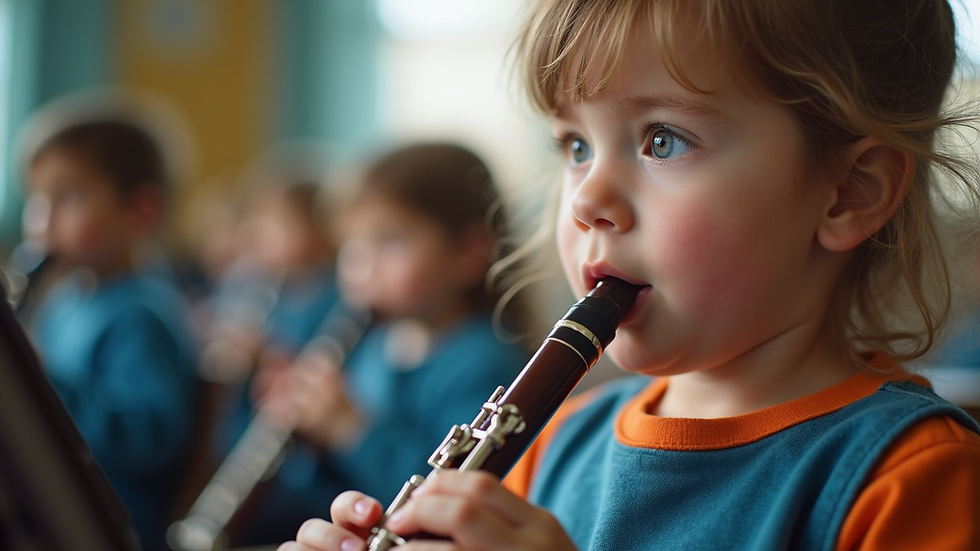Understanding the KS2 Music Curriculum
- Thomas Powell
- Sep 15, 2025
- 3 min read
Music is a wonderful way to spark creativity and build confidence in young learners. The KS2 music curriculum is designed to nurture these qualities while developing essential skills. Whether you’re a parent, grandparent, carer, school teacher, or music educator, understanding this curriculum can help you support children’s musical journeys effectively. Let’s dive into what the KS2 music curriculum involves and how it benefits children in the Tees Valley community.
What Does the KS2 Music Curriculum Cover?
The KS2 music curriculum focuses on developing children’s musical knowledge, skills, and understanding between the ages of 7 and 11. It encourages active participation in music through listening, performing, composing, and appraising. The curriculum is structured to be engaging and accessible, ensuring children enjoy their musical experiences.
Here are the key areas covered:
Listening and Appraising: Children learn to identify different styles, genres, and instruments. They develop critical listening skills by discussing what they hear.
Performing: Singing and playing instruments are central. Children perform solo and in groups, building confidence and teamwork.
Composing: Creativity is encouraged through composing original pieces using voices, instruments, and technology.
Musical Knowledge: Understanding musical elements like rhythm, pitch, dynamics, and structure is essential.
This balanced approach ensures children gain a well-rounded musical education that supports their overall development.

Exploring the KS2 Music Curriculum in Practice
In practice, the KS2 music curriculum is vibrant and varied. Teachers use a range of activities to keep lessons lively and inclusive. For example, a typical lesson might start with a warm-up singing session, followed by learning a new song or rhythm pattern. Then, children might explore composing a short piece in small groups or listen to a piece of music and discuss its features.
Practical tips for supporting children at home or in school include:
Encourage regular singing: Singing helps with pitch and rhythm awareness.
Introduce simple instruments: Recorders, keyboards, or percussion instruments are great starters.
Use technology: Apps and online resources can make composing and listening fun.
Attend local music events: Exposure to live music inspires and motivates.
By making music a regular part of daily life, children develop a deeper appreciation and stronger skills.

How the Curriculum Supports Personal Growth
Music education at KS2 is not just about notes and rhythms. It plays a vital role in personal development. Children learn to express themselves, work collaboratively, and build resilience through challenges like learning a new instrument or performing in front of others.
Here’s how the curriculum supports growth:
Confidence Building: Performing in front of peers boosts self-esteem.
Teamwork: Group performances teach cooperation and listening skills.
Creativity: Composing encourages original thinking and problem-solving.
Cultural Awareness: Exploring music from different cultures broadens horizons.
These skills are valuable beyond music lessons and contribute to a child’s overall success.

How to Make the Most of the KS2 Music Curriculum
To get the best from the KS2 music curriculum, it’s important to stay engaged and proactive. Here are some actionable recommendations:
Communicate with Teachers: Ask about the music topics being covered and how you can support learning at home.
Provide Access to Instruments: Even simple instruments at home encourage practice and exploration.
Encourage Attendance at Music Clubs: Many schools and community centres offer extra-curricular music activities.
Explore Online Resources: Websites and apps aligned with the curriculum can reinforce learning.
Celebrate Achievements: Praise progress and performances to motivate continued effort.
By taking these steps, you help children enjoy and benefit fully from their musical education.
Embracing the Musical Journey in the Tees Valley
The national curriculum music programme in the Tees Valley is supported by the Tees Valley Music Service, a fantastic resource hub. They provide expert guidance, resources, and opportunities for children and educators alike. Whether it’s through workshops, concerts, or instrument tuition, the service helps make music accessible and exciting for everyone.
Getting involved with local music initiatives can open doors to new experiences and friendships. It’s a wonderful way to nurture a lifelong love of music.
Let’s keep the music playing and the creativity flowing!



L'idée que la pratique régulière, même sur des instruments virtuels, renforce la mémoire musculaire et la coordination est particulièrement pertinente. Cela me rappelle comment, en tant que batteur, j'ai trouvé que l'utilisation d'outils numériques pouvait vraiment aider à perfectionner des rythmes complexes entre les sessions de répétition. Pour ceux qui cherchent à explorer cette approche, il existe des plateformes interactives qui permettent de s'exercer sur un kit de batterie virtuel en ligne avec des sons réalistes, ce qui est idéal pour les musiciens cherchant à améliorer leur jeu.